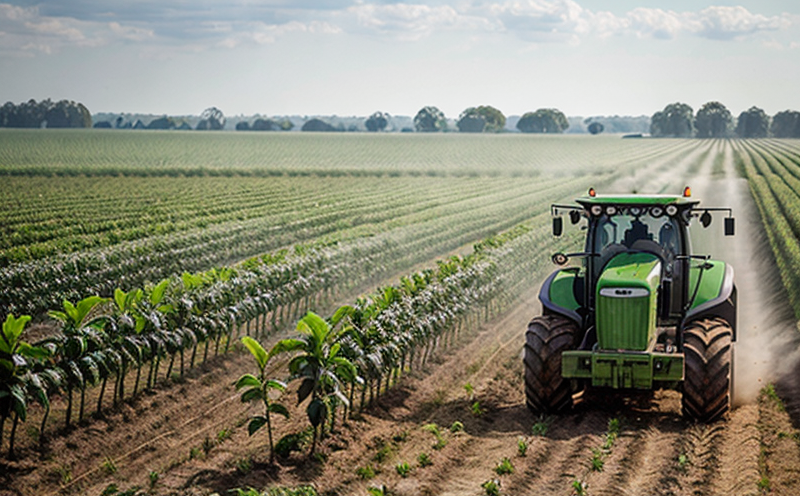Agricultural Chemical Testing
At Eurolab, our agricultural chemical testing services are designed to ensure the safety and efficacy of products used in agriculture. This service is crucial for quality managers, compliance officers, R&D engineers, and procurement teams who need to ensure that their materials meet stringent regulatory requirements.
The scope of this testing includes a wide range of agricultural chemicals such as pesticides, herbicides, fungicides, plant growth regulators, and fertilizers. Our laboratory adheres to international standards including ISO, ASTM, EN, IEC, and others, ensuring that all tests are conducted with precision and accuracy.
Our team of experts is well-versed in the latest testing methodologies and regulatory requirements for agricultural chemicals. We understand the importance of these products not only as tools for increasing crop yield but also for their impact on environmental sustainability. This understanding guides our approach to testing, ensuring that we provide reliable data that can be used to make informed decisions.
Testing begins with a thorough review of product specifications and regulatory requirements. Depending on the type of chemical being tested, this may involve identifying potential residues, evaluating biodegradability, assessing toxicity levels, or determining compatibility with other agricultural inputs. Once the scope is defined, our team prepares samples according to strict protocols.
Our state-of-the-art laboratories are equipped with advanced instrumentation such as gas chromatography-mass spectrometry (GC-MS), high-performance liquid chromatography (HPLC), and Fourier transform infrared spectroscopy (FTIR). These tools allow us to detect even trace amounts of chemicals, ensuring that our results are accurate and reliable.
The testing process involves several stages: sample preparation, analysis, and data interpretation. During sample preparation, we ensure that the samples are representative of the entire batch being tested. Analysis then follows using the appropriate analytical techniques based on the chemical type and intended use. Finally, our data analysts interpret the results to provide actionable insights.
Upon completion of testing, Eurolab provides detailed reports outlining all findings along with recommendations for any necessary adjustments. These reports are tailored to meet the needs of various stakeholders, whether it be regulatory compliance, internal quality assurance, or product development.
Benefits
- Regulatory Compliance: Ensures that agricultural chemicals comply with all relevant regulations and standards.
- Quality Assurance: Provides reliable data to support the quality of agricultural chemicals.
- Promotes Sustainability: Helps in reducing environmental impact by ensuring safe use practices.
- Innovation Support: Assists R&D teams in developing new products and improving existing ones.
Eurolab Advantages
We pride ourselves on providing exceptional service, leveraging our extensive experience and cutting-edge technology. Our commitment to accuracy and reliability is unmatched in the industry. With a team of highly skilled professionals, we ensure that every test conducted meets the highest standards.
Our laboratories are equipped with advanced instruments and software solutions that allow us to perform comprehensive analyses quickly and efficiently. This efficiency translates into faster turnaround times for our clients, enabling quicker decision-making processes.
We also offer flexible testing options tailored to meet individual client needs. Whether you require routine testing or one-off assessments, we have the capability to accommodate your requirements. Our transparent communication ensures that all parties are informed throughout the process.
Use Cases and Application Examples
| Application | Description | Test Parameters | Instruments Used |
|---|---|---|---|
| Pesticide Residue Testing | Detects pesticide residues on crops to ensure they are safe for consumption. | Residues of specific pesticides, concentration levels, persistence in the environment. | GC-MS, HPLC. |
| Fungicide Efficacy Testing | Evaluates the effectiveness of fungicides against various fungal pathogens. | Inhibition rates, mode of action, compatibility with other chemicals. | Microscopy, FTIR. |
| Fertilizer Analysis | Assesses the nutrient content and purity of fertilizers. | Nitrogen, phosphorus, potassium levels, trace elements. | HPLC, UV-Vis Spectroscopy. |
- Pesticide Residue Testing: Detects and quantifies pesticide residues on crops to ensure they are safe for consumption. This is crucial for maintaining public health standards.
- Fungicide Efficacy Testing: Evaluates the effectiveness of fungicides against various fungal pathogens, ensuring crop protection.
- Fertilizer Analysis: Assesses the nutrient content and purity of fertilizers to ensure they meet specified quality standards.





